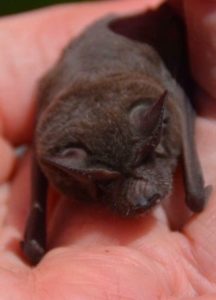Wild Amelia
Press Release
Contact: Kathy Brooks
[email protected]
June 27, 2019 11:00 a.m.
 Wild Amelia has announced that the bat—too long vilified, misunderstood, and under-appreciated –will be the “critter of the year” for the program year 2019-2020. Through its educational programs for adults and children, Wild Amelia hopes to rectify the reputation of Florida bats.
Wild Amelia has announced that the bat—too long vilified, misunderstood, and under-appreciated –will be the “critter of the year” for the program year 2019-2020. Through its educational programs for adults and children, Wild Amelia hopes to rectify the reputation of Florida bats.
There are 13 species of Florida bats, among over 1300 species worldwide. Some types of Florida’s bats are common throughout the state; others live in smaller areas of the state or migrate through the state. There are “NO” vampire bats in Florida. Among the more common types of Florida bats are Brazilian or Mexican free-tailed, Southeastern myotis, the Evening bat, the Eastern red, the Seminole, and the Northern yellow bat.
Bats are mammals, the only mammals that fly, not just glide. Their wing bone structure is very similar to that of the human hand. They are nocturnal or crepuscular (active at dawn and dusk). They are not blind, but use echolocation to capture their prey. They can fly up to 25-30 miles each night foraging for food. Bat babies are called pups and are usually born in late spring to early summer and sometimes in groups, called nurseries. There are usually 1 or 2 pups born to the bat mother, and the pups can weigh up to 25 percent of the mother’s weight, so they require lots of food. Bat mothers are quite solicitous of their pups for several months, even after they have learned to fly. Some bats like to roost alone, others in groups, and still others in large colonies. In Florida, they roost in caves, tree cavities, Spanish moss, under palm fronds; but they also will roost in manmade structures–sheds, houses, bridges and utility poles. The University of Florida is home to the world’s largest manmade bat houses.
For far too long, bats have been stereotyped as creatures to fear. Their reputation is being improved in Florida and elsewhere by the recognition of the benefits bats bring to the ecosystem. Bats are a free form of pest control for Floridians; insectivores, they consume hundreds of mosquitoes, wasps, ants and other insects nightly. It is estimated that some bats consume 3000 insects a night, equalimg their body weight. “Bat Walks” and “Bat Watching” are now forms of entertainment and eco-tourism. Bats are also pollinators of many species of plants, like bananas, mangoes, and avocados. Bats help fertilize crops and assist in seed distribution. Bat guano is also a great fertilizer and is sold commercially.
While bats are gaining acceptance for their contributions to the natural world, it is important to remember they can carry viruses, are wildlife, and should not be handled.
Wild Amelia will present educational programs on bats during the coming year. For more information about these and other educational programs for adult and children, please visit wildamelia.org and Wild Amelia on Facebook. Wild Amelia is an all-volunteer non-profit; its program year will culminate in the 14th annual Wild Amelia Nature Festival from May 15-17, 2020.
